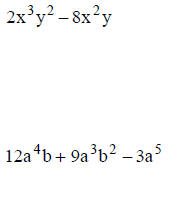Factoring Polynomials
• To factor a polynomial means to write it as a product of other polynomials.
• A polynomial is prime if it cannot be written as a product of other
polynomials.
• A polynomial is factored completely if it is written as a product of prime
factors.
• First rule of factoring : use the distributive property to factor out the
greatest common factor
• examples :

• Special factorization formulas
• Square of a binomial a2 +2ab+ b2 = (a + b)2
• Square of a binomial a2 − 2ab+ b2 = (a
−b) 2
• Difference of squares a2 − b2 = ( a +b)( a − b)
• Sum of cubes a3 + b3 = (a +b)( a2 −ab + b2 )
• Difference of cubes a3 − b3 = (a − b)(a2 + ab +b2 )
• examples :
4x2 − 64y2
8a3 + b3
4a2 −12ab+9b2
• Use trial and error (reverse the FOIL process) to factor trinomials of the
form ax2 + bx + c
• examples :
x2 − 6x + 8
2x2 − x − 6
12x2 −11x − 5
• Four terms - try factor by grouping
• example :

• examples :
8x3 + 2x −12x2 − 3
x3 − x2 − 4x + 4
• Be sure to factor each polynomial completely.
• examples :
12x2 − 22x + 6
27a4b − 8ab4


